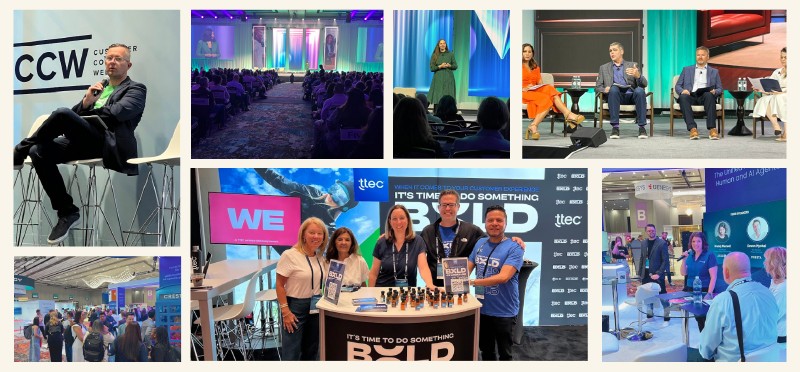During her presentation about CMP Research’s new chatbot Prism report at this year’s Customer Contact Week event, something caught the attention of speaker Nicole Kyle from the back of the keynote hall: a life-size robot mascot had mistakenly wandered into the ballroom. After freezing for a moment, she laughed that she wasn’t sure if it was a hallucination.
It was a funny example of life imitating AI imitating life – encapsulating a key theme of this year’s conference in Las Vegas, one of the largest annual gatherings of CX practitioners and technology vendors.
Since last year’s show, where it was still discussed as hypothetical, AI has become firmly rooted in contact center operations and related areas. Conversations at this year’s show revolved around balancing the human and tech elements now that AI is a coworker, not a concept.
A new kind of agent
Agentic AI was everywhere, as companies shared their latest virtual agent solutions and discussed ways to incorporate action-based AI tools into the contact center. The common denominator was a solid data foundation. “Everyone has AI, and people want to do it now,” said Scott Rohrer of Hexaware Technologies. “But it depends on if the data is ready.”
“Everything starts with data,” added Dexter Brown, vice president of global customer delivery at Dell Technologies. “The more we can curate it, the better our agents will be.”
AI is assisting human associates and rules-based AI chatbots are getting upgraded to agentic AI helpers using natural language and taking advanced actions. It’s still early days, but CX leaders are headed firmly down the path.
CMP research found that more than half (51%) of executives cite fully automated AI chatbots as their top technology investment for 2025-2026. And in these uncertain economic times, some brands are looking at AI solely to drive down costs.
That’s the wrong way to think of it, said Matthew Clare of Google AI. “Cost cutting isn’t the best value proposition for AI,” he said. “The real business value is driving retention, loyalty, and improving CSAT.”
Korissa Singh of Ujet agreed. “Deflection and cost savings are still important but shouldn’t be the goal of AI investment.”
James Bednar, head of innovation at TTEC, encouraged CX leaders to rethink how they approach AI. “Manage your AI agents like your human agents, not an IT project,” he said.
Vijay Verma, vice president of AI products at WestCX, went a step further. “Agentic AI doesn’t matter,” he said. The technology – or “how” – isn’t as important as the “why” of changing the experience for the better. Yesterday it was generative AI, today it’s agentic AI. Tomorrow it may be something else.
Striking the human/AI balance
With AI here to stay, where do humans fit in? “Elevate the humans in your environment and leverage technology to create the best experiences with high levels of empathy,” said Rebecca Jones, chief operating officer of WestCX. “Allow your humans to do what they do best.”
Even in heavily regulated industries like banking, humans can provide value beyond algorithms. “Create space for human creativity,” said Brian Sibbitt, vice president of infrastructure and operations for Equitable Bank. Include associates in AI projects and developing processes around them. He added that what are considered desirable associate skills are changing. “We can teach banking skills, but we can’t teach emotional intelligence and problem solving.”
AI’s growth is also leading to some unintended consequences for human associates. As automation takes over for simpler tasks such as password resets or bank balance lookups, human associates are left with the more complex and often more intense interactions.
“Compassion fatigue” happens more quickly and to more associates than ever before, said TTEC’s Bednar during a workshop on the limits of empathy. Companies need to be mindful of that and take measures to alleviate the extra stress associates may suffer.
Customers come first always
Neil Gibson, FedEx’s senior vice president of CX, reminded the keynote audience not to lose sight of what’s really important. “Every business was made to be in the service of customers,” he said. Put customers at the center of your business.
AI and automations should simplify experiences, but so far that goal remains elusive. Customers complain that there is more friction, not less, since AI has entered daily operations, according to Dawn Anderson, senior managing director at Accenture. Sixty-four percent of customers believe their last CX interaction was “extremely frustrating,” she said, citing recent Accenture research. What’s more, 87% of customers say one bad experience will deter them from working with a brand.
Customers want three things, she explained: Engaging, empathetic experiences; fast and effective resolutions; and to know that companies care.
Frid Edmond, senior vice president of customer engagement centers at Marriott International, added: “Don’t forget the heart, don’t forget the people, and don’t forget the customer.”














